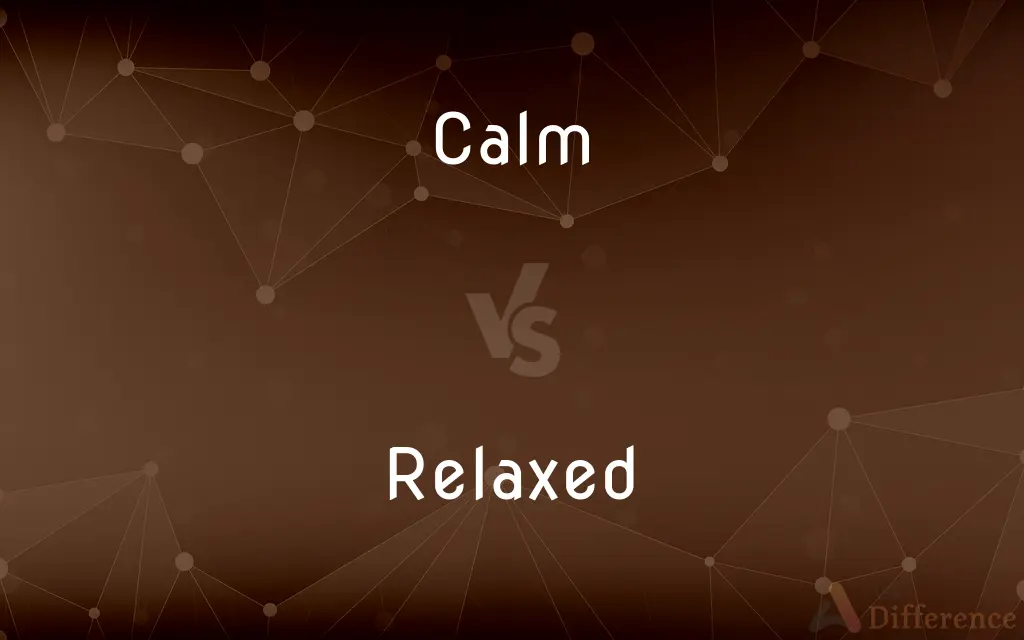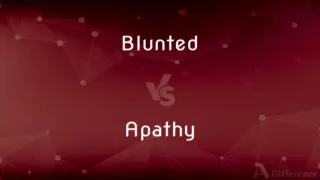Calm vs. Relaxed — What's the Difference?
Calm refers to a state of inner peace and absence of agitation, often reflective of mental tranquility, while relaxed denotes a reduction in physical tension or stress, emphasizing comfort.

Difference Between Calm and Relaxed
Table of Contents
ADVERTISEMENT
Key Differences
Calm is primarily associated with the mind and emotional state, indicating serenity, stability, and the absence of stress or anxiety. It's a state where one's thoughts are under control, and there's an overarching sense of peace. On the other hand, relaxed refers more to the physical state of being free from tension or strain. It involves the muscles being loose and the body feeling at ease, often following physical activity or in a comfortable setting.
Being calm often requires a conscious effort to manage one's thoughts and emotions, especially in stressful situations. It involves techniques like meditation, deep breathing, or positive thinking to maintain mental equilibrium. Whereas achieving a relaxed state might involve physical actions such as taking a bath, getting a massage, or sitting in a comfortable chair, focusing on reducing bodily stress and discomfort.
The effects of being calm are largely internal, influencing one's psychological well-being and emotional health. It can lead to clearer thinking, better decision-making, and a sense of inner peace that transcends external circumstances. In contrast, being relaxed affects one's physical health and comfort, contributing to lower blood pressure, reduced muscle tension, and overall bodily well-being.
External environments can influence both states differently. A peaceful, quiet setting might promote calmness by reducing mental stimuli, whereas a relaxed state can be achieved in various environments, as long as they allow the body to rest and rejuvenate. This means that one can feel calm without necessarily being relaxed and vice versa.
While calmness is often sought as a long-term trait to cultivate for improved mental health and resilience against stress, relaxation is typically sought as a temporary relief from physical exhaustion or stress. People engage in relaxation activities to recharge, while they might practice mindfulness or meditation to enhance their ability to remain calm.
ADVERTISEMENT
Comparison Chart
Primary Association
Mental and emotional state.
Physical state of being.
Techniques to Achieve
Meditation, deep breathing, positive thinking.
Taking a bath, massage, resting.
Effects
Psychological well-being, clearer thinking.
Physical health, reduced muscle tension.
Influenced By
Internal emotional and mental control.
External physical conditions and comfort.
Goal
Long-term mental resilience and peace.
Temporary physical comfort and relief.
Compare with Definitions
Calm
Achieved through mental exercises and self-awareness.
Deep breathing exercises help maintain a calm mind.
Relaxed
Often results from physical activities or rest.
A warm bath can make you feel relaxed after a long day.
Calm
Essential for emotional health and clear thinking.
A calm approach to problems leads to better solutions.
Relaxed
A state of physical ease and freedom from tension.
The massage left him feeling completely relaxed.
Calm
A state of internal peace and emotional stability.
After meditating, she felt an overwhelming sense of calm.
Relaxed
Not necessarily linked to mental calmness.
She was relaxed at the beach but still worried about work.
Calm
Reflects absence of mental stress or agitation.
Despite the chaos, he remained calm and focused.
Relaxed
Can be achieved in various comfortable settings.
He felt most relaxed lounging in his favorite chair.
Calm
Influenced by personal mindset and practices.
Regular meditation has made her more calm and resilient.
Relaxed
Contributes to physical well-being and comfort.
Staying relaxed helps reduce muscle strain and pain.
Calm
Not showing or feeling nervousness, anger, or other strong emotions
She had to keep calm at all costs
His voice was calm
Relaxed
Not rigorous or strict.
Calm
(of the weather) pleasantly free from wind
The night was clear and calm
Relaxed
Free from strain or tension.
Calm
The absence of strong emotions; calm feelings
His usual calm deserted him
Relaxed
Easy and informal in manner.
Calm
The absence of wind
In the centre of the storm calm prevailed
Relaxed
Made slack or feeble; weak, soft.
Calm
Make (someone) tranquil and quiet; soothe
I took him inside and tried to calm him down
Relaxed
Made more lenient; less strict; lax.
The relaxed rules were greatly tightened after the lawsuit.
Calm
Nearly or completely motionless; undisturbed
The calm surface of the lake.
Relaxed
Free from tension or anxiety; at ease; leisurely.
He's a relaxed kind of guy, he never lets himself get upset.
Calm
Not excited or agitated; composed
The president was calm throughout the global crisis.
Relaxed
Without physical tension; in a state of equilibrium.
Calm
An absence or cessation of motion; stillness.
Relaxed
(physiology) Of a muscle: soft, not tensed.
Calm
A condition of no wind or a wind with a speed of less than 1 knot (1.15 miles per hour; 1.9 kilometers per hour), according to the Beaufort scale.
Relaxed
Simple past tense and past participle of relax
Calm
Tranquility or serenity
"an unaccustomed reticence that I took to be the calm that follows rage" (Jeanne Marie Laskas).
Relaxed
Without strain or anxiety;
Gave the impression of being quite relaxed
A relaxed and informal discussion
Calm
To make or become calm or quiet
A warm bath will calm you. After the storm, the air calmed.
Relaxed
Made less tense or rigid;
His relaxed muscles
Calm
(of a person) Peaceful, quiet, especially free from anger and anxiety.
Calm
(of a place or situation) Free of noise and disturbance.
Calm
(of water) with few or no waves on the surface; not rippled.
Calm
Without wind or storm.
Calm
(in a person) The state of being calm; peacefulness; absence of worry, anger, fear or other strong negative emotion.
Calm
(in a place or situation) The state of being calm; absence of noise and disturbance.
Calm
A period of time without wind.
Calm
(transitive) To make calm.
To calm a crying baby
To calm the passions
Calm
(intransitive) To become calm.
Calm
Freedom from motion, agitation, or disturbance; a cessation or absence of that which causes motion or disturbance, as of winds or waves; tranquility; stillness; quiet; serenity.
The wind ceased, and there was a great calm.
A calm before a storm is commonly a peace of a man's own making.
Calm
To make calm; to render still or quiet, as elements; as, to calm the winds.
To calm the tempest raised by Eolus.
Calm
To deliver from agitation or excitement; to still or soothe, as the mind or passions.
Passions which seem somewhat calmed.
Calm
Not stormy; without motion, as of winds or waves; still; quiet; serene; undisturbed.
Now all is calm, and fresh, and still.
Calm
Undisturbed by passion or emotion; not agitated or excited; tranquil; quiet in act or speech.
Such calm old age as conscience pureAnd self-commanding hearts ensure.
Calm
Steadiness of mind under stress;
He accepted their problems with composure and she with equanimity
Calm
Make calm or still;
Quiet the dragons of worry and fear
Calm
Make steady;
Steady yourself
Calm
Become quiet or calm, especially after a state of agitation;
After the fight both men need to cool off.
It took a while after the baby was born for things to settle down again.
Calm
Cause to be calm or quiet as by administering a sedative to;
The patient must be sedated before the operation
Calm
Not agitated; without losing self-possession;
Spoke in a calm voice
Remained calm throughout the uproar
Calm
Characterized by absence of emotional agitation;
Calm acceptance of the inevitable
Remained serene in the midst of turbulence
A serene expression on her face
She became more tranquil
Tranquil life in the country
Calm
(of weather) free from storm or wind;
Calm seas
Calm
Marked by freedom from agitation or excitement;
The rioters gradually became calm and slowly dispersed
Common Curiosities
Can someone be calm but not relaxed?
Yes, one can have a calm mind while still experiencing physical tension.
Can external factors affect calmness and relaxation similarly?
External factors can influence both, but calmness is more about internal control, while relaxation can be directly influenced by external comforts.
Are relaxation techniques beneficial for achieving calmness?
They can be, as physical relaxation can sometimes lead to a calmer state of mind.
What is the best way to achieve a calm state?
Practices like meditation, mindfulness, and controlling one’s thoughts and reactions to stress.
Can calmness help with physical relaxation?
Yes, a calm mind can reduce stress-induced physical tension, aiding in relaxation.
How does culture influence perceptions of calmness and relaxation?
Cultural values and practices can shape how individuals pursue and value calmness and relaxation, including the methods they use.
Is calmness a skill that can be developed?
Yes, it can be enhanced through consistent practice of mindfulness and stress-management techniques.
Is it possible to be relaxed without being calm?
Yes, one can have a relaxed body but still feel mentally stressed or anxious.
How do calmness and relaxation affect health?
Both improve overall well-being; calmness benefits mental health, while relaxation benefits physical health.
How does physical relaxation contribute to health?
It reduces stress, lowers blood pressure, and alleviates muscle tension, contributing to overall well-being.
What activities are best for promoting relaxation?
Activities like yoga, massages, and soaking in a bath can promote physical relaxation.
How do calm and relaxed states impact decision-making?
Being calm leads to clearer thinking and better decisions, while being relaxed can reduce impulsiveness by alleviating physical stress.
Can a calm environment promote relaxation?
Yes, a calm and peaceful environment can facilitate both mental and physical relaxation.
Is it necessary to separate the pursuit of calmness and relaxation?
While interconnected, focusing on specific techniques for each can be beneficial, depending on individual needs and situations.
What role does breathing play in achieving calmness and relaxation?
Deep, controlled breathing can significantly contribute to both calmness and relaxation by reducing stress levels.
Share Your Discovery

Previous Comparison
Paste vs. Poultice
Next Comparison
Blunted vs. Apathy













































